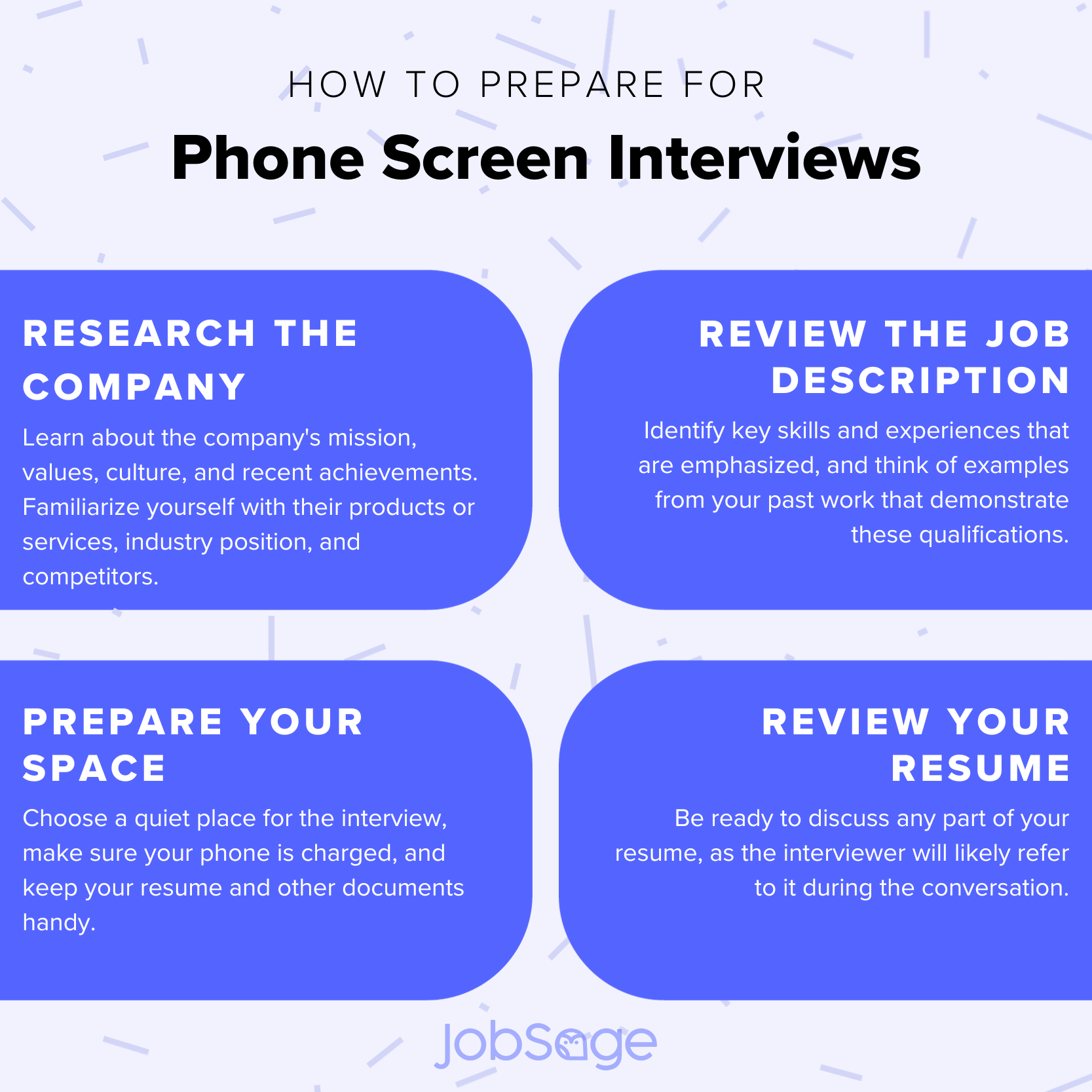A phone screen is often the first significant interaction you will have as a job candidate with an employer, and it’s important to make a good first impression!
As the name suggests, a phone screen is a preliminary interview conducted over the phone to assess whether a candidate is a good fit for the role and the organization. Unlike in-depth face-to-face interviews, phone screens are typically shorter, lasting anywhere from 15 to 30 minutes.
They are used by recruiters and hiring managers to narrow down the pool of applicants before committing to more time-intensive interview processes. Recruiters use this opportunity to verify the information on your resume, gauge your enthusiasm and understanding of the role, and determine if your professional goals align with the company’s objectives.
Here’s what you can expect to discuss during a phone screen.
Common phone screen interview questions
When preparing for a phone screen interview, anticipating the questions you might be asked is key.
While each company and role may have its specific set of questions, some common themes surface across industries. Understanding these can help you prepare more effectively and respond with confidence.
Let’s dive into some of the most frequent questions you might encounter during a phone screen interview:
1. “Can you tell me a little about yourself?”
This open-ended question is a staple in many interviews. It’s your opportunity to succinctly tell your story, highlight key achievements, and touch on what led you to apply for this position. Keep your response focused on your career journey, relevant experiences, and passions that align with the job you’re interviewing for.
2. “What do you know about our company?”
This question tests your interest and the research you’ve done on the company. It’s a chance to show that you’re not just looking for any job, but specifically interested in the company and its mission, products, or services.
3. “Why are you interested in this role?”
Here, interviewers are looking to understand your motivation for applying. Be specific about what aspects of the role excite you and how it aligns with your career goals.
4. “What are your strengths and weaknesses?”
This classic question aims to assess your self-awareness and honesty. Choose strengths that are relevant to the job and weaknesses that are genuine but not deal-breakers, and ideally, ones you’re actively working to improve.
5. “Describe a challenging situation you’ve faced at work and how you dealt with it.”
This behavioral question seeks to understand how you handle pressure and adversity.
Instead of rambling through a story, consider using the STAR format. It’s a tried and true method for answering questions like this in an interview.
- Situation: Set the scene for your story. This can include specific details such as time and place and should provide need-to-know background for the situation.
- Task: Explain the actual task that was required in the situation. What was your responsibility or what were you tasked with achieving?
- Action: Discuss the specific actions you took to address the task. This is the most critical part of your response as it showcases your approach, skills, and decision-making process.
- Result: Share the outcome of your actions. These should ideally be measurable results that demonstrate how your actions contributed to solving the problem or improving the situation.
By following this format, you’ll provide a clear and concise story that showcases your experience.
6. “Where do you see yourself in five years?”
Employers ask this to gauge your ambition, career planning, and whether your future aligns with the company’s trajectory. Don’t make the common interview mistake of saying you see the job as a quick stepping stone to something bigger and better.
Be honest, but also show that you’ve thought realistically about your career path and where this job fits in.
7. “Do you have any questions for us?”
Always have a few questions prepared. This shows your interest in the role and that you’ve thought critically about how you could fit within the company. Ask about specific aspects of the job, team dynamics, or company culture.
Perhaps even more importantly, don’t ask basic questions that could be found with a quick Google search. This can indicate that you didn’t do your research.
RELATED: What to Ask a CEO in an Interview (From an Actual CEO)

How to prepare for a phone screen interview
Preparation is key to excelling in any phase of the interview process.
Here are some essential tips to help you prepare effectively for the phone screen interview questions:
- Research the company: Gain a thorough understanding of the company’s mission, values, culture, and recent achievements. Familiarize yourself with their products or services, industry position, and competitors. This information will not only help you answer questions about the company but also formulate questions to ask the interviewer.
- Review the job description: Identify key skills and experiences that are emphasized, and think of examples from your past work that demonstrate these qualifications.
- Prepare your space: Choose a quiet, comfortable place for the interview where you won’t be disturbed. Ensure a good phone connection and that your phone is fully charged or plugged in. Keep your resume, the job description, and any notes handy for quick reference.
- Review your resume: Be ready to discuss any part of your resume, as the interviewer will likely refer to it during the conversation. You’ll probably be asked about your experiences, achievements, and any gaps in employment.
By following these steps, you’ll set yourself up for success in your phone screen interview!
Phone screen interview tips
Of course mastering the phone screen requires more than just preparation— it’s also about how you conduct yourself during the call! The following are some essential tips to keep in mind while you’re in the midst of your phone screen.
1. Start strong.
Greet your interviewer with a friendly, professional tone. Introduce yourself confidently and express your gratitude for the opportunity to interview.
2. Listen carefully.
Pay close attention to what the interviewer is saying. This shows respect and allows you to provide more targeted, thoughtful responses. Don’t hesitate to ask for clarification if you don’t understand a question.
3. Speak clearly and concisely.
Since you’re communicating solely through your voice, clarity and brevity are key. Avoid using filler words and speak at a measured pace. Make sure your answers are to the point and focused on the question asked.
4. Show enthusiasm.
Even though the interviewer can’t see you, your excitement for the role can still be conveyed through your voice. Use an upbeat tone and express enthusiasm for the job and the company.
5. Mind your body language.
Even though it’s a phone interview, your body language can impact your voice. Smiling while you speak can project a positive, confident tone. Standing up or sitting straight can also make your voice more energetic and clear.
6. Close on a positive note.
As the interview wraps up, reiterate your interest in the role and thank the interviewer for their time. You can also ask what the next steps in the hiring process will look like.
The first step on your new job journey
By keeping these tips in mind, you can navigate your phone screen interview with confidence and poise. Remember, the phone screen is your opportunity to make a lasting first impression and pave the way for future interviews in the hiring process. Take a deep breath— you got this!
